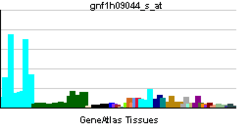STARD3NL
| STARD3NL | ||||||
|---|---|---|---|---|---|---|
| Identifiers | ||||||
| Aliases | STARD3NL, MENTHO, STARD3 N-terminal like | |||||
| External IDs | MGI: 1923455 HomoloGene: 11501 GeneCards: STARD3NL | |||||
| RNA expression pattern | ||||||
 | ||||||
| More reference expression data | ||||||
| Orthologs | ||||||
| Species | Human | Mouse | ||||
| Entrez | ||||||
| Ensembl | ||||||
| UniProt | ||||||
| RefSeq (mRNA) | ||||||
| RefSeq (protein) | ||||||
| Location (UCSC) | Chr 7: 38.18 – 38.23 Mb | Chr 13: 19.36 – 19.4 Mb | ||||
| PubMed search | [1] | [2] | ||||
| Wikidata | ||||||
| View/Edit Human | View/Edit Mouse |
MENTHO or STARD3 N-terminal like protein (STARD3NL) is an integral membrane protein of unknown function.[3] As the alternate name implies, MENTHO, short for "MLN64 N-terminal homologue", contains a region in its N-terminus similar to that found in STARD3, also known as MLN64, but lacks the StAR-related transfer domain (START) that characterizes all other proteins given the "STARD" (START domain-containing) name. The N-terminal domain is called a MENTAL (MLN64 N-terminal) domain.
Like MLN64, MENTHO is widely expressed in tissues of the body. Within the cell, it localizes to the membranes of late endosomes and may interact there with MLN64. It is suggested that in combination with MLN64, this protein helps regulate the flow of cholesterol through the endosomal pathway.[4]
References
- ↑ "Human PubMed Reference:".
- ↑ "Mouse PubMed Reference:".
- ↑ "Entrez Gene: STARD3NL STARD3 N-terminal like".
- ↑ Alpy F, Tomasetto C (2006). "MLN64 and MENTHO, two mediators of endosomal cholesterol transport.". Biochem. Soc. Trans. 34 (Pt 3): 343–5. doi:10.1042/BST0340343. PMID 16709157.
Further reading
- "Toward a complete human genome sequence.". Genome Res. 8 (11): 1097–108. 1999. doi:10.1101/gr.8.11.1097. PMID 9847074.
- Alpy F, Wendling C, Rio MC, Tomasetto C (2003). "MENTHO, an MLN64 homologue devoid of the START domain.". J. Biol. Chem. 277 (52): 50780–7. doi:10.1074/jbc.M208290200. PMID 12393907.
- Strausberg RL, Feingold EA, Grouse LH, et al. (2003). "Generation and initial analysis of more than 15,000 full-length human and mouse cDNA sequences.". Proc. Natl. Acad. Sci. U.S.A. 99 (26): 16899–903. doi:10.1073/pnas.242603899. PMC 139241
 . PMID 12477932.
. PMID 12477932. - Scherer SW, Cheung J, MacDonald JR, et al. (2003). "Human chromosome 7: DNA sequence and biology.". Science. 300 (5620): 767–72. doi:10.1126/science.1083423. PMC 2882961
 . PMID 12690205.
. PMID 12690205. - Hillier LW, Fulton RS, Fulton LA, et al. (2003). "The DNA sequence of human chromosome 7.". Nature. 424 (6945): 157–64. doi:10.1038/nature01782. PMID 12853948.
- Clark HF, Gurney AL, Abaya E, et al. (2003). "The secreted protein discovery initiative (SPDI), a large-scale effort to identify novel human secreted and transmembrane proteins: a bioinformatics assessment.". Genome Res. 13 (10): 2265–70. doi:10.1101/gr.1293003. PMC 403697
 . PMID 12975309.
. PMID 12975309. - Ota T, Suzuki Y, Nishikawa T, et al. (2004). "Complete sequencing and characterization of 21,243 full-length human cDNAs.". Nat. Genet. 36 (1): 40–5. doi:10.1038/ng1285. PMID 14702039.
- Tuckey RC, Bose HS, Czerwionka I, Miller WL (2004). "Molten globule structure and steroidogenic activity of N-218 MLN64 in human placental mitochondria.". Endocrinology. 145 (4): 1700–7. doi:10.1210/en.2003-1034. PMID 14715710.
- Gerhard DS, Wagner L, Feingold EA, et al. (2004). "The status, quality, and expansion of the NIH full-length cDNA project: the Mammalian Gene Collection (MGC).". Genome Res. 14 (10B): 2121–7. doi:10.1101/gr.2596504. PMC 528928
 . PMID 15489334.
. PMID 15489334. - Alpy F, Latchumanan VK, Kedinger V, et al. (2005). "Functional characterization of the MENTAL domain.". J. Biol. Chem. 280 (18): 17945–52. doi:10.1074/jbc.M500723200. PMID 15718238.
- Olsen JV, Blagoev B, Gnad F, et al. (2006). "Global, in vivo, and site-specific phosphorylation dynamics in signaling networks.". Cell. 127 (3): 635–48. doi:10.1016/j.cell.2006.09.026. PMID 17081983.
External links
- STARD3NL protein, human at the US National Library of Medicine Medical Subject Headings (MeSH)